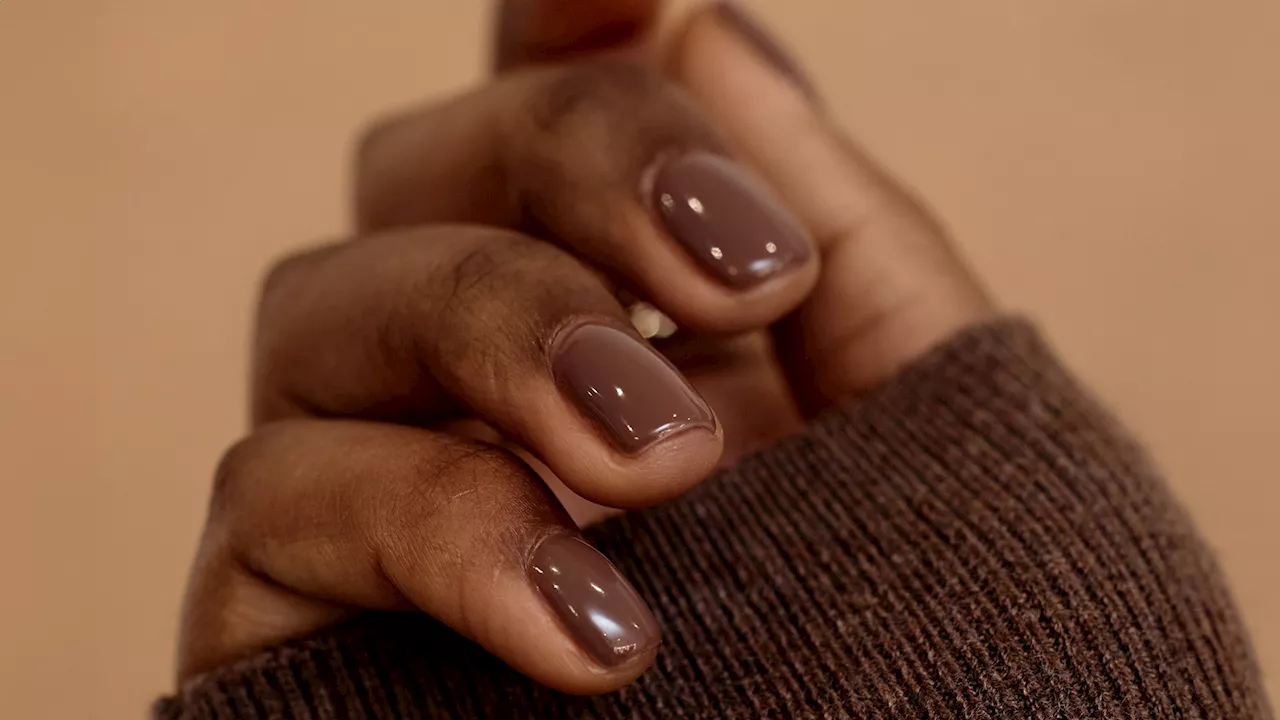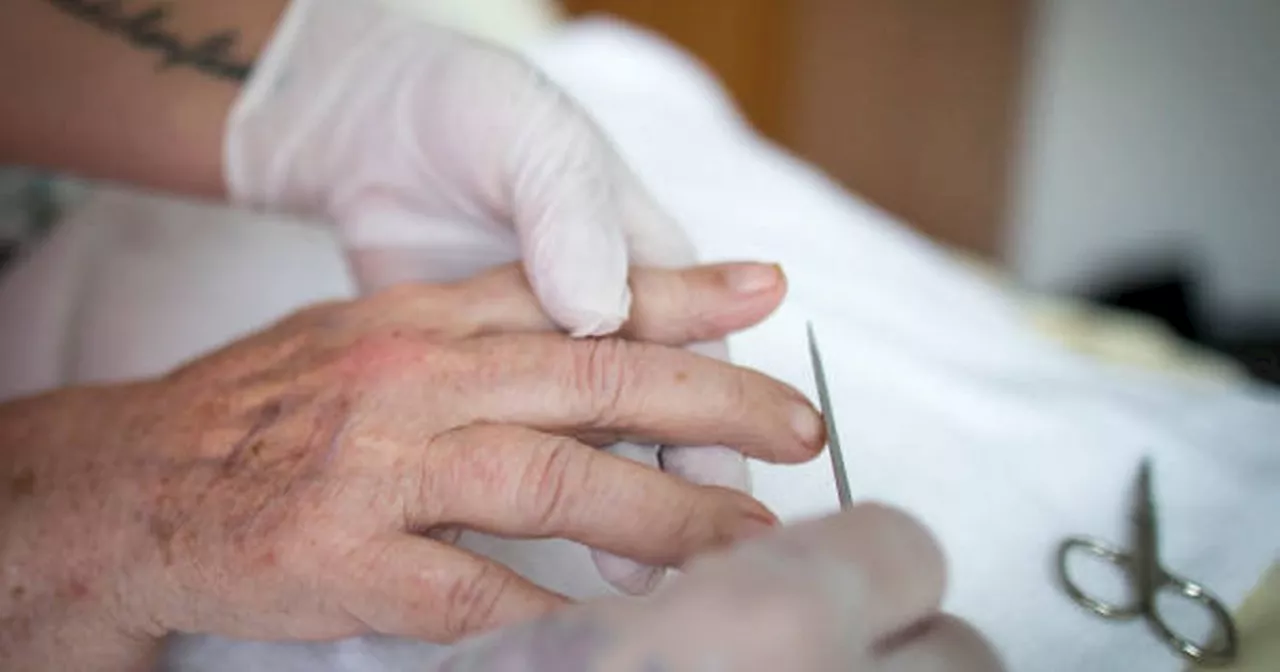Menopause can cause changes in your nails, making them more brittle and prone to breakage. This article explores how hormonal shifts during menopause affect nail health and offers tips for maintaining strong and healthy nails.
Menopause is an inevitable part of many of our lives - from hot flushes to wavering hormone levels. And the hormonal impact of the menopause can affect more of the body than previously realised. Your mid-forties may welcome small changes in your body, which you will notice before going through menopause. This period is known as perimenopause, and lasts from four to eight years. Menopause is defined as having gone a year without a period, and has an average entry age of 51.
Other than the textbook symptom of hot flashes, brittle nails, dehydration and flakiness are also common side effects. Women's health experts and leading nail techs explain just how this period of your life can affect your nails, and what you can do to keep on top of your manicure during the menopause. \How menopause impacts the health of your nails During perimenopause and menopause, a drop in oestrogen can significantly impact the health of your nails. “Oestrogen is essential for maintaining hydration in the body, including your nails,” explains Paint Nails London‘s lead nail tech Angie Campbell. “As oestrogen levels drop, nails often lose their natural moisture and become more brittle. In perimenopause, these changes may be subtler, but as menopause sets in, the effects can become more pronounced. “Women may notice thinning, peeling or slower nail growth as their nails struggle to retain strength and hydration,” says Campbell. \Why your nails become brittle and prone to breakage “Brittleness of the nails is also called Onychorrhexis from the Greek derivation onycho – meaning ‘nail’, and rhexis – meaning ‘bursting’,” explains menopause advisor for A.Vogel, Eileen Durward. When they begin to split, crack or chip, your nails can be described as 'brittle'. Durward says: “The yellowing of nails or nails curling at the top also suggests that they are brittle.' Keratin is the protein produced in the nail bed that helps form your nails’ strong outer layer. “When the body is healthy, nails are strong and evenly formed. If your nails are showing signs of brittleness, it is an indication of an imbalance in your keratin production,” says Durward. \How to keep your manicure strong and hydrated Hydration levels can decline during menopause, but this is an important factor for a strong and healthy manicure. “Start with a good-quality cuticle oil – look for products containing jojoba oil, vitamin E or almond oil,” advises Campbell. “Applying it daily helps restore moisture and strengthens the nail bed. A hydrating hand cream is also a must. Regular nail strengthening treatments can also help restore damaged nails and fortify them against breakage.” \If you’re seeing your nails become thinner or more brittle, you should prioritise rest and gentler care when it comes to your nail routine. “Use a glass or crystal nail file instead of traditional emery boards to reduce microtears,” suggests Campbell. “Apply a strengthening base coat regularly to provide added support, and avoid over-trimming or aggressive cuticle pushing to prevent damage to the nail matrix.” If you're a fan of gel or acrylic manicures, Campbell advises taking regular breaks to allow your nail beds time to recover and breathe. There are a few habits to adopt so you can help protect your nails from day-to-day wear
MENOPAUSE NAIL HEALTH BRITTLENESS HYDRATION NAIL CARE
United Kingdom Latest News, United Kingdom Headlines
Similar News:You can also read news stories similar to this one that we have collected from other news sources.
 Menopause Support Campaigner Highlights NHS Failures in Surgical Menopause CareDiane Danzebrink, a menopause support campaigner, calls for an urgent review of surgical menopause care after receiving numerous accounts from women who felt they were not adequately prepared for the procedure's side effects. She highlights concerns about NHS failures in providing comprehensive support and guidance to women undergoing surgical menopause.
Menopause Support Campaigner Highlights NHS Failures in Surgical Menopause CareDiane Danzebrink, a menopause support campaigner, calls for an urgent review of surgical menopause care after receiving numerous accounts from women who felt they were not adequately prepared for the procedure's side effects. She highlights concerns about NHS failures in providing comprehensive support and guidance to women undergoing surgical menopause.
Read more »
 Former Care Child dedicates Life to Improving Lives of Children in Foster CareAmanda Taylor, who experienced 27 moves during her childhood in care, has dedicated nearly 40 years to working with Action for Children. Now the operational director in the north of England, she is passionate about ensuring children in care receive dignity and respect.
Former Care Child dedicates Life to Improving Lives of Children in Foster CareAmanda Taylor, who experienced 27 moves during her childhood in care, has dedicated nearly 40 years to working with Action for Children. Now the operational director in the north of England, she is passionate about ensuring children in care receive dignity and respect.
Read more »
 How to Remove Gel Nail Polish at Home Without Damaging Your NailsAward-winning nail artist Kirsty Meakin shares tips on how to safely remove gel nail polish at home, including avoiding picking or peeling and using acetone nail polish remover.
How to Remove Gel Nail Polish at Home Without Damaging Your NailsAward-winning nail artist Kirsty Meakin shares tips on how to safely remove gel nail polish at home, including avoiding picking or peeling and using acetone nail polish remover.
Read more »
 Government Plans to Improve Social Care SystemThe UK government is announcing plans to improve the social care system, focusing on better training for care workers, increased data sharing, and digitalization of care services. These changes aim to enhance the quality of care for elderly and vulnerable individuals, reduce pressure on the NHS, and ensure patients receive more joined-up care.
Government Plans to Improve Social Care SystemThe UK government is announcing plans to improve the social care system, focusing on better training for care workers, increased data sharing, and digitalization of care services. These changes aim to enhance the quality of care for elderly and vulnerable individuals, reduce pressure on the NHS, and ensure patients receive more joined-up care.
Read more »
 My doctor said it was the menopause - but I had Parkinson'sWomen's risk of Parkinson's is similar to men's - but they are much more likely to be misdiagnosed, with serious consequences for their health and treatment
My doctor said it was the menopause - but I had Parkinson'sWomen's risk of Parkinson's is similar to men's - but they are much more likely to be misdiagnosed, with serious consequences for their health and treatment
Read more »
 The Impact of Menopause on Skin HealthThis article explores how aging and menopause affect skin health, highlighting changes in skin texture, radiance, and sensitivity. It emphasizes the importance of a comprehensive skincare routine and the role of collagen, antioxidants, and hormonal balance in maintaining youthful skin.
The Impact of Menopause on Skin HealthThis article explores how aging and menopause affect skin health, highlighting changes in skin texture, radiance, and sensitivity. It emphasizes the importance of a comprehensive skincare routine and the role of collagen, antioxidants, and hormonal balance in maintaining youthful skin.
Read more »
